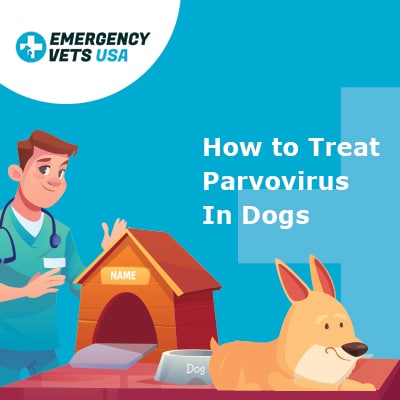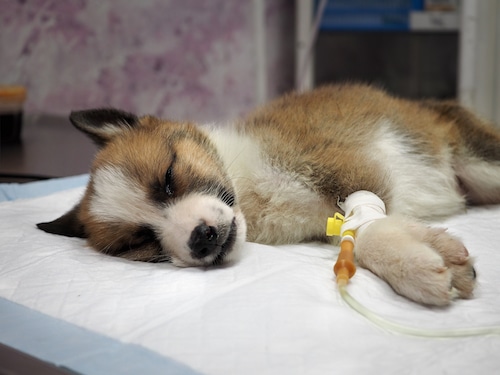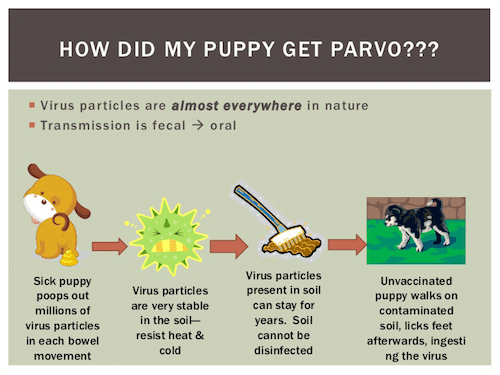How To Treat Parvovirus In Dogs
Parvovirus, parvo for short, can cause puppies to become very sick.
It is more common for puppies to get it because of their susceptible immune system.
Adult dogs can get sick from it, too.
There is not a specific antidote or cure for the virus itself, but infected dogs can receive treatment to help them survive.
Oftentimes treating parvo ends up being in an emergency-type situation, as it can cause puppies to become dehydrated very fast.
Most times you won’t realize something is wrong until your dog is very sick.
What Is Parvo And How Can My Dog Get It?

Parvo is a common viral disease of dogs that is extremely contagious.
It can be deadly if the proper protocols are not taken for treatment and prevention
It is spread dog to dog through direct contact or by coming into contact with the fecal material of an infected dog.
A susceptible dog can even acquire it if they come into contact with viral particles that an infected dog left behind.
Once a susceptible dog becomes infected, the virus attaches to the dog’s intestinal lining, causing them to become very sick.
What Are The Signs Of Parvo In Dogs?
Once the virus attaches to a dog’s intestines, it causes severe inflammation and irritation within the gut.
This can lead to the following signs:
- Severe diarrhea (usually with blood in it)
- Nausea & vomiting
- Decreased appetite or completely refusing food
- Lethargy/decreased energy
- Dehydration
- Weight loss
Sometimes these signs can almost seem to come on all of a sudden.
Infected dogs can become dehydrated very fast since they are not properly absorbing any nutrition or fluids.
They are losing most of their hydration through vomiting and diarrhea.
How Is Parvo Treated?

There is a bedside “snap” test for parvovirus that needs a small sample of your dog’s stool.
This will allow your vet to confirm if they are positive for the virus.
Once infection is confirmed, treatment needs to begin immediately otherwise an emergency could happen.
There is not a specific antidote or medication to kill the virus.
Treatment is focused on providing hydration and preventing or treating secondary bacterial infections that have developed so your dog’s immune system can focus on fighting off the virus itself.
Parvovirus treatment includes:
- Well-balanced fluid therapy (either intravenous/IV or subcutaneous/under the skin)
- Anti-nausea medications (usually by injection)
- Antibiotics
- Anti-diarrheal medications
- Probiotics
Once your dog’s nausea is well controlled, it is very important to offer them high-quality, easily digestible food to restore their nourishment.
This easily-digested food should be offered frequently and in small amounts throughout the day to keep something in their belly, while decreasing the risk of the vomiting.
Wet food is usually tastier and easier to do this with.
Give 1-2 tablespoons of food every 1-2 hours is a good starting point.
Parvo is treatable and many dogs survive.
However, some dogs and young puppies who are very sick may not survive treatment.
If their intestines are already too far damaged, they can become septic from the normal bacteria in their gut taking advantage of the damage and moving over into their blood stream.
If this has already happened, the chance of them surviving is very low.
Average Parvo Treatment Costs
Most dogs infected with parvo need to be hospitalized and on IV fluids to have the best outcome.
Hospitalization will usually be required for anywhere from 3-5 days.
The cost of treatment in the hospital may range from $1000-$3000+, depending on how long they need to be hospitalized, how sick they are, and what facility they are hospitalized in.
Emergency clinics and specialty clinics are usually more expensive than general practice clinics.
Contact your local veterinarian to make sure they can treat your dog for extended periods of time.
Your vet might give you a few options but plan on paying between $1000-$2500 for severe cases of parvo.
What To Do If You Cannot Afford Parvovirus Treatments?
If hospitalization is not an option due to cost, some clinics can provide you with at-home treatment options.
The veterinary clinic will give the initial fluids and anti-nausea medication in the clinic.
It will be up to you to administer the fluids by injection.
You will also have to give antibiotics and nausea medications by mouth (without causing them to vomit).
This treatment method is less than ideal and has a high failure rate, but sometimes is the only way to go.
At-home parvo treatment will usually cost between $250-300.
After successful treatment, it is very important that the dog is given a thorough bath to wash off any remaining viral particles that may be in its fur.
Don’t forget the area the dog was in needs to be thoroughly cleaned with a diluted bleach solution.
PetAlive Parvo-K
PetAlive Parvo-K Canine Parvovirus Dog Supplement is a natural remedy that helps to temporarily relieve the common symptoms associated with parvovirus. When your best bud is suffering from vomiting and diarrhea, this herbal supplement provides digestive support while maintaining the cooling mechanisms of the body, helping to balance the fluids in your good boy. This non-addictive remedy is paw-fect for your puppy or adult dog and is great tasting! Simply sprinkle the blend on your furry friend’s tongue for rapid absorption.
Can I Prevent My Dog From Getting Parvovirus?

The best way to prevent your dog or puppy from getting parvo is to make sure they receive their parvo vaccines according to the exact schedule your veterinarian recommends.
According to the American Animal Hospital Association, the parvo vaccine is considered a “core” vaccine of dogs, which means every dog should be vaccinated for it.
The vaccine guidelines recommend that puppies as young as 6 weeks of age should receive their first parvo vaccine.
They should then receive booster doses of the vaccine every 2-4 weeks until they are at least 16 weeks of age.
One year later, they will need another booster. Then, the vaccine only needs to be given every 3 years.
It is also important that young puppies are not allowed contact with other dogs or puppies who are not vaccinated, or who the vaccine status is unknown.
Try to avoid taking young puppies to pet stores and other places with many dogs until they have received at least 2 doses of the parvo vaccine.
Parvovirus is preventable and can be very expensive to treat, make sure to take your puppy to see a veterinarian shortly after you acquire them to keep them on their proper parvo vaccination schedule.
It’s also important to maintain a relationship with a veterinary clinic throughout the years to ensure your adult dog stays up to date on their parvo vaccine as well.
Can Adult Dogs Get Parvo?
Yes, your adult dog can get parvo, but once your dog has had parvo and survived, it is very unlikely that they can get parvo twice.
Parvovirus is a virus that dogs can get if they come into contact with the virus.
This is why it is very important to stay on top of your dog’s vaccination schedule.
The parvo vaccination is part of that schedule that will help protect your young and older dog.
If your adult dog does get parvo, their chances of survival are much higher than if they were a puppy.
Just plan for a higher veterinarian bill if they require medical help.

Leslie Brooks graduated from the University of Tennessee College of Veterinary Medicine in 2012. After graduation she moved to Indianapolis to do an intensive one-year internship at a specialty practice and then began working as a small animal general practitioner. She ran her own house call practice for three years, visiting pets in people’s homes. Currently, she works part time in clinical practice and volunteering her free time to serve pets of the homeless. Read more about us here.

